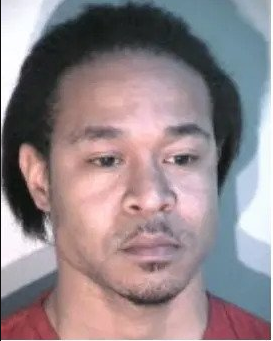Detroit man convicted of sex trafficking, child pornography at house of horrors
- Oops!Something went wrong.Please try again later.
Ryon Travis didn't just brutalize women, the feds say.
He also hurt children in a brothel he ran out of his Detroit home, where, they say, he enslaved women, sold them for sex on the internet and took sexually explicit photos of minors and sold them online.
Among his victims, authorities say, was a woman he chained to a stripper pole by the neck to keep her from leaving. She is now free. Travis is not.
Six years after police raided his home and discovered what they described as a house of horrors, a federal jury convicted Travis this week on sex trafficking and child pornography charges that carry a mandatory minimum of 15 years in prison. Travis, 38, who has seven children — none in his custody — faces up to life in prison when he is sentenced in November.
Human trafficker exploited victims in 'brutal ways'

Travis was convicted following a three-day trial before U.S. District Judge Bernard Friedman, who previously ruled that Travis — who claimed to have four wives — was competent to stand trial.
“This defendant exploited a child and an adult victim in brutal ways. He targeted a vulnerable woman and took advantage of her for his own profit,” U.S. Attorney Dawn Ison stated in announcing Monday's conviction, adding that human trafficking remains one of her office’s "top priorities."
Travis's attorney, Martin Crandall, declined comment.
According to court records and the U.S. Attorney's Office, here is how the federal government discovered Travis's sex trafficking ring:
The case started with West Bloomfield police investigating identity-theft crimes that led to a raid of Travis' home in the 16000 block of Tuller in 2016. Three women were in the house that day. Travis referred to them as his wives, including a 25-year-old woman who was found chained by her neck to a stripper pole in the living room.
When police asked Travis why she was chained, he told them he was “about to get freaky with her,” court records show.
Travis, however, wound up in chains instead.
More: 'Run mom, run!': How West Bloomfield human trafficking victim got away
More: Pimp 'branded' human-trafficking victims, forced them to tattoo his name on their faces
'Sex trafficking occurs all around us'

Following his 2016 arrest, he appeared in handcuffs, belly chains and shackles in U.S. District Court, where he pleaded not guilty in a case that prosecutors say is more commonplace than people realize.
“Sex trafficking occurs all around us, and the victims are sometimes hiding in plain sight,” former U.S. Attorney Barbara McQuade told the Free Press at the time, noting that the traffickers go to great lengths to keep their victims quiet.
“The victims often feel powerless to flee because the trafficker exerts power over them — physical violence, threats, drugs, fear of arrest — or even shame," McQuade said.
While searching Travis' house, police seized two cellphones that belonged to Travis and found pornographic images of children, including multiple images of an adult male having sex with a young girl while she was lying on a distinctive blue and white sheet.
A sheet with that same description was seized from the house that day.
Chained, beaten and robbed
Federal agents also interviewed the woman they found chained to the pole. Here, according to court documents, is what she told them:
The woman had lived with Travis and three other women for two years. She said that she had been chained up for the past two weeks because she had tried to escape. When Travis caught her, she told authorities, he beat her and held her in bondage.
She also said that Travis posted ads on the internet advertising that he had four women for sale. Men would come to the house, and Travis would line the four women up and let the men choose one. But they would pay him first — in cash.
The woman also said that Travis took her to the bank every month when her $700 Social Security disability check arrived, made her cash the check and then stole the money from her.
"This was essentially a brothel or a house of prostitution," a federal prosecutor previously argued in court.
More: Sex. Booze. Lies: The secret life of a famous U-M violin prof who preyed on girls
More: West Bloomfield woman's stalker showed up 20 years after breakup to kidnap her
Travis tried many times to be released on bond, and sought to have his case thrown out, arguing: "I'm a natural-born human of the American land. I choose not to do business with this court. I ask that this case be dismissed."
All of his requests were denied and he remained locked up pending the outcome of his trial.
As U.S. Magistrate Judge Mona Majzoub told him in denying him bond: "You are a danger to children. You are a danger to women. And you are a danger to people who are helpless in your presence."
How to combat human trafficking
Law enforcement officials stress that the public — perhaps more than anyone else — can help spot human trafficking victims. Common places for human traffickers include construction sites, restaurants, elder care centers, nail salons, agricultural fields and hotels.
According to the U.S. Department of State, here are some red flags that could alert you to a potential trafficking situation that should be reported:
A person is living with his or her employer.
Multiple people are living cramped in a small space.
A person is unable to speak to you or anyone alone, or their answers appear scripted or rehearsed.
Employer is holding identity documents.
A person appears submissive, fearful or shows signs of physical abuse.
A person is unpaid or paid very little.
If a red flag does go up, here are some sample questions to ask:
Can you leave your job if you want to?
Can you come and go as you please?
Have you been hurt or threatened if you tried to leave?
Has your family been threatened?
Do you live with your employer?
Where do you sleep and eat?
Are you in debt to your employer?
Do you have your passport or identification? If not, who has it?
If you have a human trafficking tip to report, call the National Human Trafficking Resource Center at 888-373-7888. This is a national 24-hour, toll-free, multilingual hotline.
Contact Tresa Baldas: tbaldas@freepress.com
This article originally appeared on Detroit Free Press: Ryon Travis guilty of sex trafficking, child pornography in Detroit

